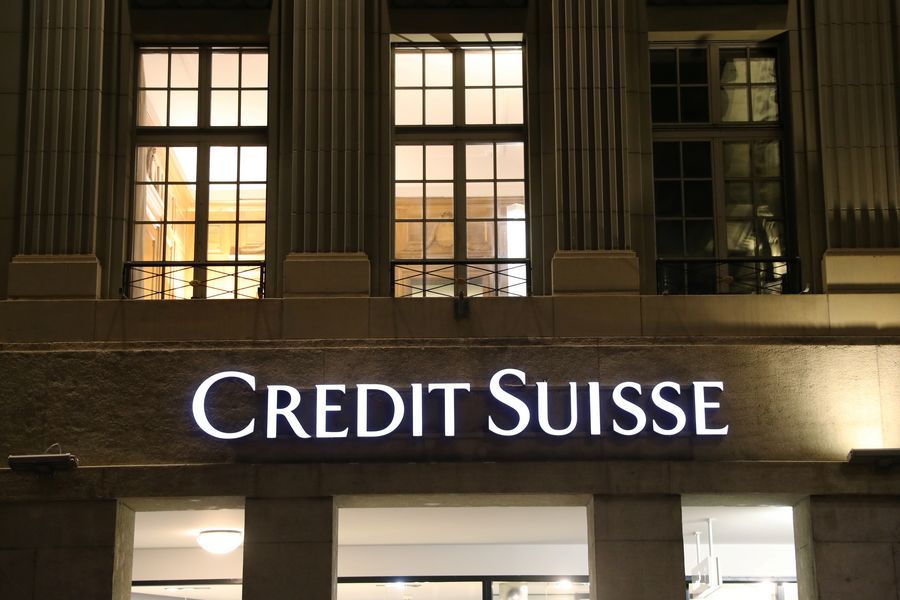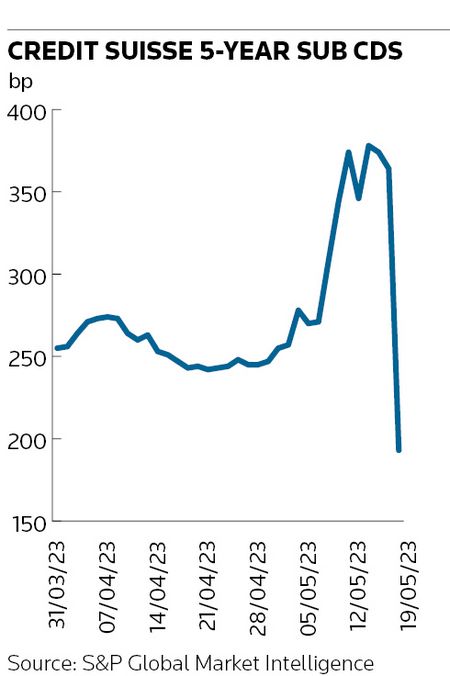
The drama surrounding Credit Suisse and the credit default swap market isn’t over just yet.
The Credit Derivatives Determinations Committee, a group of banks and investment funds that rules on CDS matters, has been asked for the second time in a matter of days whether or not default swap payouts on Credit Suisse’s debt had been triggered around the time of its emergency rescue by UBS. Many believe this last-gasp attempt to trigger CDS is likely to fail after the committee unanimously voted down another question on Wednesday, also considered a long shot.
Regardless of the outcome, the Credit Suisse saga offers a foretaste of how a crucial part of the infrastructure underpinning the US$10trn credit derivatives market will function in the coming years without the troubled Swiss lender.
With Credit Suisse recused from taking part, only 11 institutions voted on Wednesday to reject the first CDS trigger question, underlining how thinly staffed the decision-making panel has become. It is supposed to have 15 members. And while Credit Suisse’s exclusion and the outcome of the vote were both expected, market experts say the committee may need reform if the Swiss bank’s absence becomes permanent following its absorption into UBS.
“I don’t think it needs drastic surgery, but I think it’s important that people realise how crucial a well-functioning committee is for the wellbeing of the market,” said Athanassios Diplas, a former bank trader who helped design much of the modern CDS market architecture.
“Situations like this [the Credit Suisse question] make it abundantly clear that people need to be focused and they need to dedicate resources to keep the committee functioning."
Crucial infrastructure
The committee is a crucial piece of infrastructure that keeps the credit derivatives market running from one day to the next. It is supposed to comprise 10 banks and five investment funds – a mix aimed at encouraging a diversity of views on the panel. But the committee has shrunk in line with the declining CDS market in recent years – and Credit Suisse's demise looks set to deplete its ranks further.
The 11 votes cast against the Credit Suisse CDS trigger set a new low for a ruling on a major credit event and was a far cry from the 15 votes for which the mechanism was originally designed. In April, asset manager AllianceBernstein became the latest firm to withdraw from the committee and its departure followed that of hedge fund Cyrus Capital Partners last year, leaving just nine dealers and three investment funds on the committee.
Credit Suisse signed up for another term as a dealer member of the committee in late April, several weeks after the announcement of the UBS acquisition. But there is no guarantee it will remain if the UBS transaction closes as expected. UBS left the committee several years ago after cutting back in CDS trading. Credit Suisse, for its part, made swingeing cuts to its credit trading unit last year before its near collapse. Credit Suisse and UBS declined to comment.
The committee has often attracted criticism, not least because its members can stand to gain or lose economically from decisions it makes, though there are important safeguards built into the committee's structure designed to counter this and prevent market manipulation. They include maintaining a balance between banks and investment funds, as well as requiring a super-majority of 80% for most decisions to be carried, to encourage members to reach consensus.
A permanent change in the committee's membership may require a rewriting of its rules to ensure those safeguards remain intact. "There may need to be a discussion about tweaks to make sure the voting numbers work," said Diplas.
"The main principles of the committee were to have a breadth of expertise and to ensure it wasn’t biased, so it’s not dominated by either buyers or sellers of CDS. It’s also important that most of the decisions are taken by super-majority to avoid external arbitration. A larger number of participants makes that easier."

Muddling through
So far, at least, the committee has muddled through with reduced membership and produced results that most CDS traders anticipated. That includes ruling that a so-called government intervention credit event had not occurred after SFr16bn (US$17.8bn) of Credit Suisse’s Additional Tier 1 bonds were wiped out as part of UBS’s forced takeover.
The committee made that ruling after hedge funds including Diameter Capital and FourSixThree Capital loaded up on CDS that would pay out if the contracts were triggered. The decision hinged on whether a £250m slug of Tier 2 debt that Credit Suisse had previously issued (but had since matured) was deemed to be senior to the bank's AT1 bonds. Many believed the chances of a trigger were remote, but markets still moved after the question was posed, suggesting traders hadn't completely written it off.
Credit Suisse’s five-year subordinated CDS jumped as high as 378bp on Monday, according to S&P Global Market Intelligence, compared with under 250bp at the start of the month. That widening meant funds betting on a CDS trigger may still have been able to make money from the trade – provided they were able to cash out when spreads peaked.
Credit Suisse’s sub CDS traded at 193bp on Friday morning, the tightest level since last June, after the committee decided the Tier 2 bonds were senior and that CDS hadn't been triggered. Another Credit Suisse question was put to the committee on Thursday, this time whether a bankruptcy credit event had occurred.
But the fact that CDS spreads barely budged suggests traders are confident the committee will reject that query too. The committee is due to meet on Monday to consider the question.